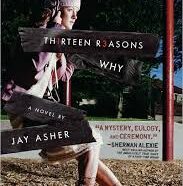CSN is 50: Review of “13 Reasons Why” by Stephen Fogarty
If you consume fiction in anyway you will inevitably come across what I have come to call “the void,” a stasis where after finishing some truly great film or television show for example, you are plunged into a mini depression (think sitting on a park bench feeding birds as violin music plays softly in the background). If you are from my generation then you will probably have had this once you finished reading Harry Potter but it’s a feeling I have come across a few times and it has always followed something great; it is a sign that I have found something special, and today I present to you one of these rare stories: 13 Reasons Why by Jay Asher.
Not long after the suicide of American high school student Hannah Baker, her fellow student Clay Jensen receives seven cassette tapes (two sides each) in the mail. These tapes – recorded by Hannah – contain the names and stories of the 13 people whose actions pushed her to take her own life (hence the title). These tapes also contained the instructions to pass them along; the tapes where originally sent to number 1 on the list who sent it to number 2 and so on.
One of the great strengths of the book is the characterisation of Hannah Baker. In the hands of a less skilled writer she might have been too cheery and funny in an attempt to get the reader to like her more, or too morose making it harder for the reader to relate. The balance between these two is struck perfectly and while yes, she isn’t just completely and utterly depressed, you don’t forget for a second that this is a deeply troubled young woman. And really this is the one thing that a book like this has to get right: when everything hinges on the thoughts and feelings of a character you have to make her feel real and this is done so well at some points that it feels like more of a memoir than fiction.
One of the few complaints I have is that the point of view character of Clay Jensen isn’t a developed character; rather, she is stripped of any defining personality traits to simply serve as a way for the reader to insert themselves into the novel (the Twilight series had the same problem). However, this isn’t as glaring a problem as it would be if this were a traditional beginning-middle-and-end narrative. Instead, being told in the way it is, the character of Clay isn’t so much a character but a vehicle; without him the story could not be told even if his contribution is minimal.
Speaking of how the story is told, I think that it is the best thing the book has going for it. You know how it is going to end and you have this knot in your stomach of fearful anticipation like watching a car crash in slow motion. You know what is going to happen right from the get go, and it has that effect of being difficult to put down that goes with any great story.
To be perfectly honest, even though I find it difficult to communicate my feelings, it’s the kind of thing that sticks with you, where experiencing the story is in itself an emotional experience; it’s the kind of story that you don’t forget and I don’t know if better praise can be given.
One final note: I highly recommend the audio-book version of this story. The performances put in by voice actors is, well, incredible. The actress playing Hannah Baker does such an amazing job that if you listened to just the tapes and nothing else you would think that they are one hundred percent genuine.






